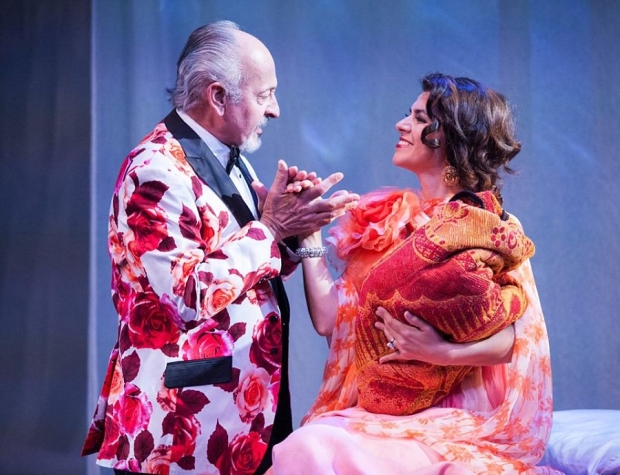Destiny of Desire

(© C. Stanley Photography)
In Destiny of Desire, a world premiere that recently ran at Arena Stage, playwright Karen Zacharías has written a work that has been compared with a television genre popular throughout Latin America: the telenovela, a Spanish-language soap opera that emphasizes outsize characters, emotions, and ideas. Yet Zacharías considers her play with music more a tribute to telenovelas than a satire of them. The show contains all the passion, jealousy, love, anger, and desire of a telenovela, but its form – a play within a play – allows Destiny to comment on itself as its tale unfolds. With its all-Latino cast, this production of Zacharías' play grows from a populist comedy into a serious comment on meaningful contemporary issues.
The scene is set even before the show begins with members of a touring company strolling around the stage and into the audience. They try on costumes and look at scripts. One actress, a brunette, talks to the director and tries on a gown as another actress, a blond, enters and grabs the gown. The director gives in to the blond, and the play begins.
During a storm one night in Bellarica, Mexico, two baby girls are born. One is healthy, one is weak. One will grow up surrounded by riches. The other will grow up in a life of misery. When the mothers are introduced to the audience and to each other, it becomes clear that one, the blond Fabiola Castillo, is a former beauty queen who has never given up her desire for power. She believes her wealthy husband, Armando, will insist on a healthy baby, so she swaps her weak baby for the stronger. The other mother, Hortensia del Rio, and her husband, Ernesto, vow to love "their" baby forever.
Act 1 compresses time until the girls, Victoria and Pilar, are teenagers. Hortensia is Fabiola's housekeeper, and Victoria and Pilar eventually meet and become friends. Armando Castillo's grown son, Sebástian, returns home to get back in his father's good graces. Sebástian and Pilar fall in love at first sight. The actual facts of the plot, however, are not as important as the way they unravel, tumbling along in a fluid stream of words, music, and Latin dancing, mingling realms of mythology with modern make-believe, as mankind's most ancient taboo against incest improbably brushes up against a visit from "Cinderella."
Gabriela Fernandez-Coffey is delightful as Fabiola Castillo, who stops at nothing to get her way. Cástulo Guerra is excellent as her husband, who treats Fabiola like a queen until he realizes her true nature. The role of their daughter is played with pizzazz by Esperanza America, whose strong soprano is perfect for the role. Nicholas Rodriguez is well cast as Sebastian Castillo, whose stage presence and clear, powerful tenor fit the role exactly.
Hortensia del Rio is stunningly portrayed by Rayanne Gonzales; one could only wish there were more songs for her to sing. Carlos Gómez turns in a fine performance as Ernesto del Rio. Their daughter is portrayed with delicacy and grace by Elia Saldaña. Marian Licha shines as Sister Sonia, and Fidel Gomez is very funny as Dr. Diego Mendoza.
Destiny of Desire is fortunate to be directed by José Luis Valenzuela, artistic director of the Latino Theatre Company and the Los Angeles Theatre Center. He keeps the action moving quickly and credibly. Rosino Serrano's original music is essential to the straight-ahead momentum of the play. She accompanies the musical on a grand piano situated stage right.
The play comprises 16 scenes, separated from one another when cast members draw white silk curtains across the stage. François-Pierre Couture's set uses one large set piece, a huge arch, which serves to signify Castillo's monumental home and a church. Occasional smaller set pieces are wheeled in to establish different locations. Robert Barry Fleming's choreography keeps the movement clear and concise. Julie Weiss' costume design handily displays the range of clothing, from tattered to elegant.
Zacharías has written that she uses comedy to "examine serious issues of gender, class and race." Although all those social issues are alluded to in this play, it's hard to hear the messages over the laughter. And in this case, that's OK. For its imagination and high-octane singing and dancing, Destiny of Desire is well worth tuning into.










